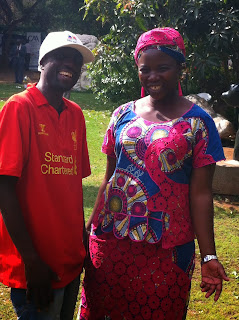

Having attended an event not too long ago where Petina Gappah and Alexander Fuller got together to discuss their writing, well actually for Petina to ask Alexander about her latest book, I was a little tentative about tonights BookCafe Bookclub. We were discussing Petina's short story collection, An Elegy for Easterly, with Petina herself.
Oooh.
I didn't much enjoy the last event, it felt very staged and I felt very managed and distant in the
audience. Had I projected my disappointments onto Petina herself? But then these are/were two very different events.
Petina appeared relaxed and happy, a person amongst people, in this small crowd of 20 readers. She seemed to be nursing an ailment of sorts and asked the waiter for a 'hot, hot' glass of water with a whisky and some sugar on the side. Two ginormous spoons of sugar into a small amount of the water and whisky. It is that time of year I guess with the colder months drawing in.
But I digress.
I had only managed to read one short story from the book, In The Heart of the
Golden Triangle, a story about moving up, perhaps a little too quickly, into Harare's wealthier suburbs. A rather harsh but not unbelievable narrative of a set, because they come in three's - Leaticia, Tendai, Bertha - of unhappy women married to wealthy bankers. I can't remember why I read this one. but a strong social comment, something Petina has not been shy of in many of her articles, essays and stories.
Tonights discussion revealed just how broadly read and appreciated Petina's writing is. Our deck of readers had shuffled into them a German couple as well as a Swedish visitor and a few 'groupies' thrown in who came just to see Petina.
The short story, The Annexe Shuffle, resonated with one of our readers, who testified to the reality Petina brought to the story which was based on a lived experience of her own (having loved and lost a subsequent drinking binge saw her sober up whilst in the Annexe and then have to sit out her detention). These little gems sprung up all night. Another story, The Diplomat, was built from an actual experience by a very new and naive Zambian Diplomat Petina had known who was duped by Nigerian fraudsters - you must have had one of those emails.
The story, My cousin-sister Rambanai, also struck a common cord with the group, family members leaving Zimbabwe, coming back, going away again, shades of grey, lost accents, half truths and bold face lies. Then there is the Mupandawana Dancing champion, a 'What if....' story crafted from a Herald court story about a man dancing himself to death in a year peaking and troughing financially and politically.
And, the very last story, Midnight at the Hotel California, a tale of strange bedfellows and a short history of wheeler dealing in Zimbabwe.
Part of Petina's success is her writing style. She writes mostly in the first person, drawing you close and keeping it real. She deals in realist fiction, telling us "You will never find talking dogs in my stories - even though I am very fond of dogs". She decries the use of a glossary to explain the Shona she uses or the mixed in Shon-glish. She uses a lot. African languages should not be 'exoticised' she insists, nobody routinely puts a glossary for French or German words used in English novels (two other languages she also reads fluently in).

I watch Petina signing books at the end, on the plastic chair in her rolled-up wide legged jeans, a ringmasters coat on with pink glittery swirls on the sleeves and an everyday felt scarf in a slightly different shade of rosy purple. She looked lovely.
She told us she wants to write the particular in a way that is universal; we say yes she does.
Look out for Petina curating the Literacy Programme at HIFA next year- international and local writers- woowoo!
Also, the launch of a short film based on her story 'Something Nice from London' at the National Gallery in July, and of course her debut novel 'Book of Memory' to be published in the UK April 2014 (just in time to discuss it at HIFA).
I cannot think of a better way to meet and interact with authors than through this book club approach.
 What struck me this year is how many teenagers are interested in what we are doing at the tent and the library in general. We generally target the younger group, but it is the 14 to 18 year old that are asking us to engage them.
What struck me this year is how many teenagers are interested in what we are doing at the tent and the library in general. We generally target the younger group, but it is the 14 to 18 year old that are asking us to engage them. 








































